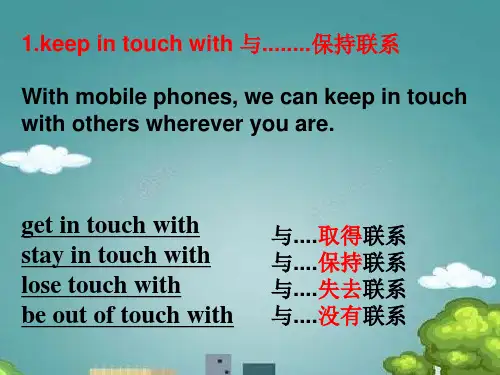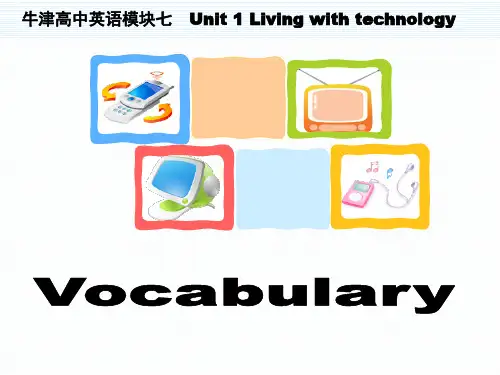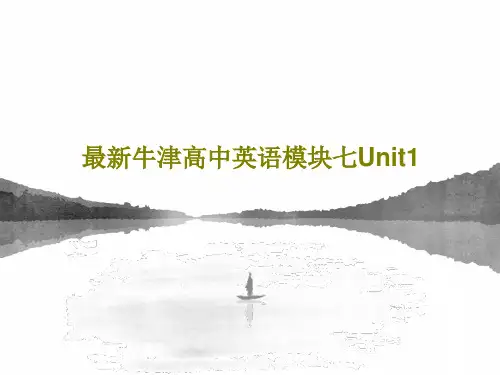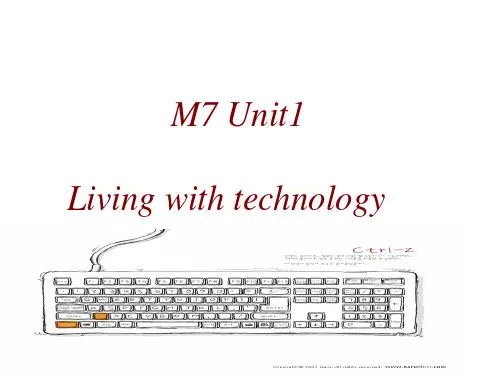牛津高中英语模块七 Unit 1
- 格式:ppt
- 大小:3.62 MB
- 文档页数:67
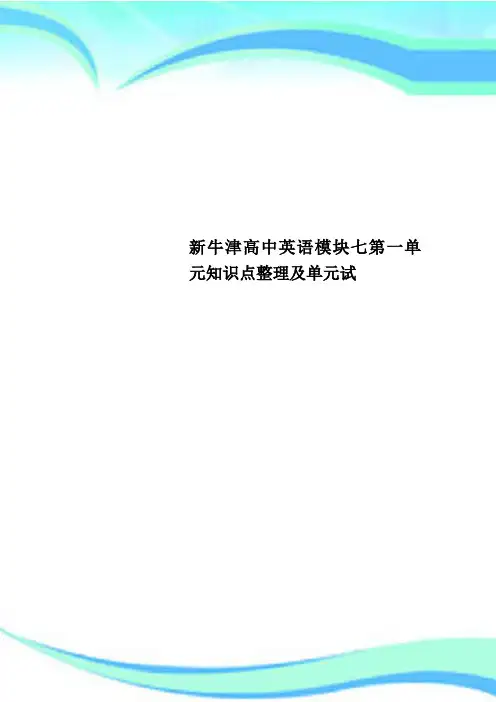
新牛津高中英语模块七第一单元知识点整理及单元试————————————————————————————————作者:————————————————————————————————日期:新牛津高中英语模块七第一单元知识点整理及单元练习M7 UNIT1一、词汇大集合【单词】1. It is still uncertain who invented TV. 至今还未能确定谁发明了电视。
uncertain adj. 不确定的;无把握的;是certain的反义词▲be uncertain about / of sth. 对…不确定/ 没把握They are both uncertain about what to do. 他们两人都拿不定主意该怎么办。
▲It’s uncertain + 主语从句It’s uncertain whether he will come tomorrow. 他明天不一定会来。
2. superior adj. 优秀的;上等的;有优越感的;无比较级 n. 上级;上司▲be superior to 优于;胜过His new computer is technically superior to mine. 他的新电脑在技术上超过了我的。
I’m going to complain to your superiors. 我要找你的上司投诉。
3. wind vt. 上发条;缠;绕; 摇;弯曲前进;迂回;蜿蜒(wound; wound)▲wind up 给…上发条He wound up the toy car and let it go. 他给玩具车上发条然后松手让它跑。
▲wind through 蜿蜒穿过The river winds through the woods. 那条河蜿蜒流过树林。
▲wind one’s way 蜿蜒向前;曲直延伸The Great Wall winds its way over mountains from the west to the east.4. apply vt. / vi. 应用;运用;申请;▲apply sth. to sth. 把…应用于…Scientific discoveries are often applied to industry. 科学发明常运用于工业。
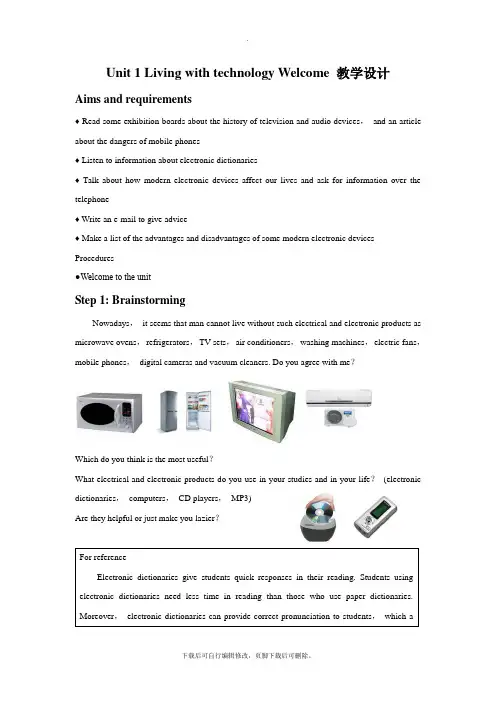
Unit 1 Living with technology Welcome 教学设计Aims and requirements♦ Read some exhibition boards about the history of television and audio devices,and an article about the dangers of mobile phones♦ Listen to information about electronic dictionaries♦Talk about how modern electronic devices affect our lives and ask for information over the telephone♦ Write an e-mail to give advice♦ Make a list of the advantages and disadvantages of some modern electronic devices Procedures●Welcome to the unitStep 1: BrainstormingNowadays,it seems that man cannot live without such electrical and electronic products as microwave ovens,refrigerators,TV sets,air conditioners,washing machines,electric fans,mobile phones,digital cameras and vacuum cleaners. Do you agree with me?Which do you think is the most useful?What electrical and electronic products do you use in your studies and in your life?(electronic dictionaries,computers,CD players,MP3)Are they helpful or just make you lazier?For referenceElectronic dictionaries give students quick responses in their reading. Students using electronic dictionaries need less time in reading than those who use paper dictionaries. Moreover,electronic dictionaries can provide correct pronunciation to students,which aAs we can see,with the rapid development of electronic technology in the last few decades,electrical and electronic products have made ou r lives more convenient. I’d like to give you some examples.Now,let’s have a discussion: What do you think life would be like without these products?Step 2: Sharing information1. Let’s enjoy some wonderful ads about some electrical and electronic produ cts. What conclusion can you draw?Do you think the progress has made our lives more convenient or has made simple things more complicated?2.Group work. Look at the four pictures at page 1. Let’s study them one by one and try to discuss some questions in group of four.Picture 1What kind of TV do you have at home?What differences can you find between the TV in your home and the TV in this picture?(Early TV had antennae on top. The screen was very small and could show only black-and-white pictures. The size of the TV was small compared with modern TV,and usually it looked like a wooden box. Early TV also did not have a remote control. The control panel was on one side of the screen.)What kind of pictures did early TV have?(Early TV had black-and-white pictures that were fuzzy.)What other functions do you need in a modern TV?Picture 2What did people need when they wanted to record music in the past?(Tapes and a tape recorder.)How did people record music in the past?(People put the tapes into the recorder,then played the tape with music at one side and pushed the play and record buttons at the other side to record the music onto the blank tape.)Look at the picture. What devices do people need to record music now?(A computer,an MP3 player and some recording software.)How do People record music using a computer?(People copy the music from a CD to the computer using recording software. The music will then be digitalized in and played by an MP Player. )Picture 3How do you look up a word in a paper dictionary?(The words in a paper dictionary are arranged in alphabetical order from ‘A’ to ‘Z’. We need to look at the first letter of the word and use it to search in the dictionary. If two words start with the same letter,we look at the second letter to decide the alphabetical order. If the first and second letters are the same,we look at the third letter and so on.)How many of you have an electronic dictionary?How do you look up a word in such a dictionary?(We key in the word we want to look up and cli ck the button ‘Enter’. Then the word entry will appear on the screen.)Besides the dictionary,what else can be stored in your electronic dictionary?(There can be a calendar,a list of addresses and phone numbers,memos or a clock. More recent electronic dictionaries have large memory space and some can be used as electronic books with hundreds of books stored inside.)Which do you prefer,an electronic book or a traditional paper book?Why?Picture 4How did people keep in touch in the past?(People sent letters in the past,but letters wereslow,and they took from a few days to several months to arrive. Then people invented the telegraph,but the telegraph could send only short sentences. Later,people could communicate via telephone,but the disadvantage was that not everyone had a telephone. Now,people use e-mails to communicate. E-mails are quick,but people without computers and access to the Internet cannot send e-mails. Today,most people use mobile phones to keep in touch with others. The size of a mobile phone is small so people can carry one in a pocket and receive and make calls wherever they are and whenever it is.)What recent developments have been made to mobile phones?(Now,mobile phones have more and more functions. They can send text messages. They can also be used as a digital camera to take still or even moving pictures. People can send the pictures they take to other mobile phones or e-mail addresses. Mobile phones can be connected to the Internet and people can look at web pages with mobile phones. More technologically advanced mobile phones can receive TV signals so that people can watch live TV programmes on their mobile phones.)It is reported that many high school students bring mobile phones to their schools. Do you think high school students should use mobile phones at school?Why or why not?Please express your ideas freely and make sure that all of you have a chance to speak. Step 3: Discussion:1. How have different electronic devices changed over time?2. How have these inv entions improved people’s lives?Step 4: Homework:1. Collect more information about the development of some electronic and electrical devices.2. Prepare the Reading part.。
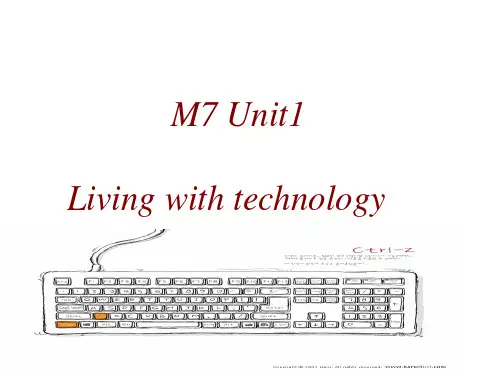
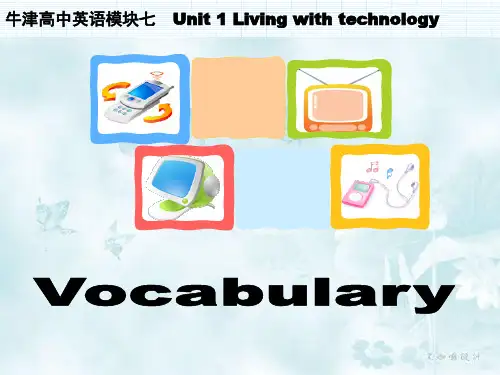
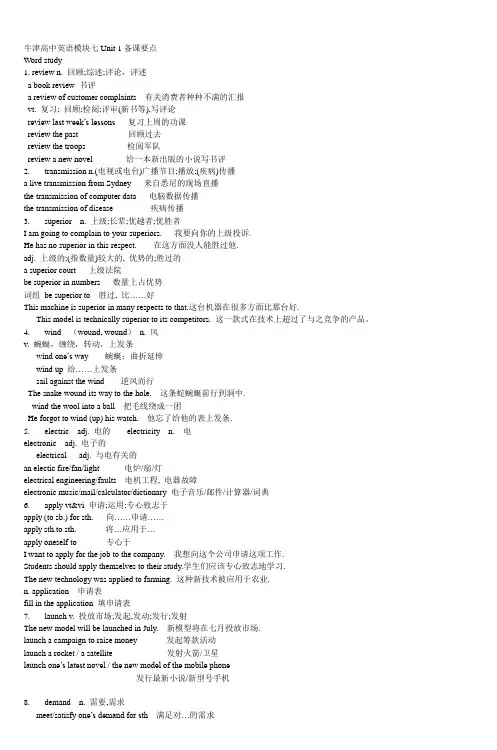
牛津高中英语模块七Unit 1备课要点Word study1. review n. 回顾;综述;评论,评述a book review 书评a review of customer complaints 有关消费者种种不满的汇报vt. 复习; 回顾;检阅;评审(新书等),写评论review last week’s lessons 复习上周的功课review the past 回顾过去review the troops 检阅军队review a new novel 给一本新出版的小说写书评2. transmission n.(电视或电台)广播节目;播放;(疾病)传播a live transmission from Sydney 来自悉尼的现场直播the transmission of computer data 电脑数据传播the transmission of disease 疾病传播3. superior n. 上级;长辈;优越者;优胜者I am going to complain to your superiors. 我要向你的上级投诉.He has no superior in this respect. 在这方面没人能胜过他.adj. 上级的;(指数量)较大的, 优势的;胜过的a superior court 上级法院be superior in numbers 数量上占优势词组be superior to 胜过, 比……好This machine is superior in many respects to that.这台机器在很多方面比那台好.This model is technically superior to its competitors. 这一款式在技术上超过了与之竞争的产品。
4. wind (wound, wound)n. 风v. 蜿蜒,缠绕,转动,上发条wind one’s way 蜿蜒;曲折延伸wind up 给……上发条sail against the wind 逆风而行The snake wound its way to the hole. 这条蛇蜿蜒前行到洞中.wind the wool into a ball 把毛线绕成一团He forgot to wind (up) his watch. 他忘了给他的表上发条.5. electric adj. 电的electricity n. 电electronic adj. 电子的electrical adj. 与电有关的an electic fire/fan/light 电炉/扇/灯electrical engineering/faults 电机工程, 电器故障electronic music/mail/calculator/dictionary 电子音乐/邮件/计算器/词典6. apply vt&vi 申请;运用;专心致志于apply (to sb.) for sth. 向……申请……apply sth.to sth. 将…应用于…apply oneself to 专心于I want to apply for the job to the company. 我想向这个公司申请这项工作.Students should apply themselves to their study.学生们应该专心致志地学习.The new technology was applied to farming. 这种新技术被应用于农业.n. application 申请表fill in the application 填申请表7. launch v. 投放市场;发起,发动;发行;发射The new model will be launched in July. 新模型将在七月投放市场.launch a campaign to raise money 发起筹款活动launch a rocket / a satellite 发射火箭/卫星launch one’s latest novel / the new model of the mobile phone发行最新小说/新型号手机8. demand n. 需要,需求meet/satisfy one’s demand for sth 满足对…的需求make demands on 对…提出要求v. 要求demand an apology from sb.要求某人道歉He demanded that the right to vote (should) be given to every adult woman.他要求选举权给予每一位成年女性.He demanded to meet the general manager. 他要求见总经理.9. degree n. 程度; 度; 学位to a certain degree/to some degree在某种程度上Water freezes at 0°C.(zero degrees centigrade) 水在0℃结冰.I agree with you to a certain degree. 在某种程度上我赞同你的观点.She received a doctor’s degree. 他获得了博士学位.10.spring n.春天;泉水;弹簧;弹性;发条The rubber has lost its spring. 橡皮没有弹性了.The spring of my watch is broken. 我手表的发条坏了.a mineral spring 矿泉水vi.(sprang-sprung) 跳跃;弹起spring up突然出现,涌现,迅猛发展The cat crouched ready to spring. 猫弓起背准备跳.Amusement parks for children are springing up all over the world. 孩子们的游乐场如雨后春笋般在全世界涌现出来.11.delight n. 高兴,喜悦.to one’s delight让某人高兴的是take delight in 以…为乐The naughty boy took delight in pulling the dog’s tail. 这个调皮的男孩喜欢拽狗尾巴.v. 使…高兴All things delight us. 事事都让我们高兴.adj. delighted delightingI’m delighted to receive your letter.12.convenience n. 方便,便利at one’s convenience 在某人方便的时候Can you telephone me at your convenience to arrange a meeting ?adj. convenientif it is convenient to sb. 如果你方便的话(注意:不可用人做主语.)13.assume vt. 假设,认为It is generally assumed that 。
